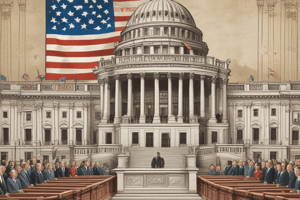Podcast
Questions and Answers
What is federalism?
What is federalism?
A system in which power is divided between the national and state governments.
How does federalism guard against tyranny?
How does federalism guard against tyranny?
By dividing the government into two so that the government has power but the states have power too.
What does James Madison's quote about different governments controlling each other imply?
What does James Madison's quote about different governments controlling each other imply?
It provides double security for the government.
What is meant by separation of powers?
What is meant by separation of powers?
What is the meaning behind Madison's quote about the accumulation of powers?
What is the meaning behind Madison's quote about the accumulation of powers?
What does each branch of government do?
What does each branch of government do?
How does separation of powers guard against tyranny?
How does separation of powers guard against tyranny?
What are checks and balances?
What are checks and balances?
How can the legislature check the power of the chief executive?
How can the legislature check the power of the chief executive?
How can the president check the power of the Supreme Court?
How can the president check the power of the Supreme Court?
How can the Supreme Court check the Senate?
How can the Supreme Court check the Senate?
How do the framers guard against tyranny?
How do the framers guard against tyranny?
Which states had the smallest representation in the House of Representatives?
Which states had the smallest representation in the House of Representatives?
Who had the most representation in the House of Representatives?
Who had the most representation in the House of Representatives?
How was the number of representatives in the House determined?
How was the number of representatives in the House determined?
How does the big states vs. small states issue guard against tyranny?
How does the big states vs. small states issue guard against tyranny?
Flashcards
Federalism
Federalism
Division of power between national and state governments.
Separation of Powers
Separation of Powers
Dividing government power among three branches: legislative, executive, and judicial.
Checks and Balances
Checks and Balances
Each branch of government can limit the other branches' power.
Madison's view on Power Consolidation
Madison's view on Power Consolidation
Signup and view all the flashcards
Double Security
Double Security
Signup and view all the flashcards
Legislative Branch
Legislative Branch
Signup and view all the flashcards
Executive Branch
Executive Branch
Signup and view all the flashcards
Judicial Branch
Judicial Branch
Signup and view all the flashcards
Virginia Plan
Virginia Plan
Signup and view all the flashcards
New Jersey Plan
New Jersey Plan
Signup and view all the flashcards
House Representatives
House Representatives
Signup and view all the flashcards
Presidential Role in Appointment
Presidential Role in Appointment
Signup and view all the flashcards
Judicial Oversight
Judicial Oversight
Signup and view all the flashcards
Balancing Interests
Balancing Interests
Signup and view all the flashcards
Safeguards Against Tyranny
Safeguards Against Tyranny
Signup and view all the flashcards
Study Notes
Federalism
- Federalism divides power between national and state governments, preventing concentration of authority.
- National government manages taxation; state governments handle education, ensuring local control.
James Madison's Perspective
- Madison's quote emphasizes a system of double security where different governments counterbalance each other.
- This layered governance provides stability and reduces risks of tyranny.
Separation of Powers
- Powers are divided among three branches: legislative (makes laws), executive (enforces laws), and judicial (interprets laws).
- Each branch operates independently, preventing any single branch from gaining undue power.
Madison's View on Power Accumulation
- Madison warned against consolidating powers within one entity, labeling it as tyranny.
- Advocated for distinct separation of powers to safeguard liberty and prevent autocratic rule.
Checks and Balances
- Each government branch can limit the powers of others to prevent abuse.
- The legislative can override presidential vetoes, approve nominations, and impeach.
Role of the President
- The president influences the Supreme Court by appointing judges, impacting the judiciary's power.
Judicial Oversight
- The Supreme Court checks the Senate by declaring laws unconstitutional, maintaining judicial authority.
Safeguards Against Tyranny
- Framers designed a system where branches have enough power to limit one another, creating a balanced government.
Representation in Congress
- Bigger states favored the Virginia Plan for increased power based on population.
- Smaller states preferred the New Jersey Plan to ensure equal representation.
Representation Details
- Rhode Island and Delaware are the least represented, each with one House member.
- Virginia has the highest representation in the House at ten members, reflecting its larger population.
Determining Representation
- The number of representatives per state is based on population size, affecting legislative power dynamics.
Balancing Interests
- The conflict between big and small states reinforces checks against tyranny, ensuring all states have representation, thus promoting equitable governance.
Studying That Suits You
Use AI to generate personalized quizzes and flashcards to suit your learning preferences.




